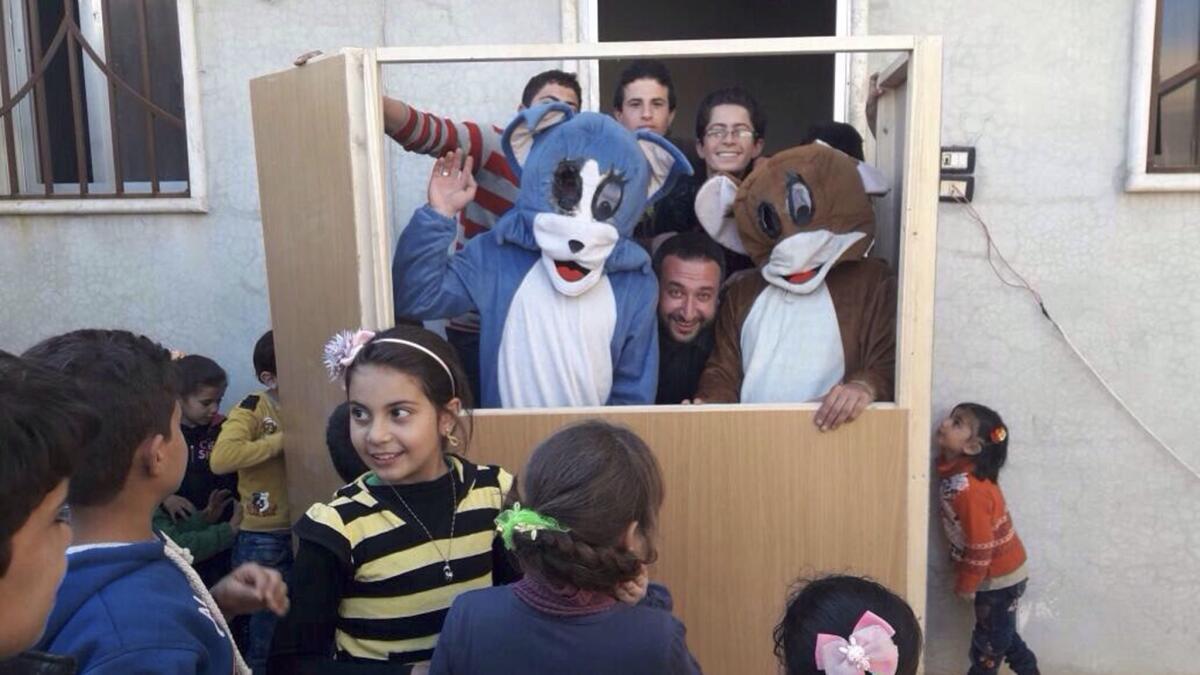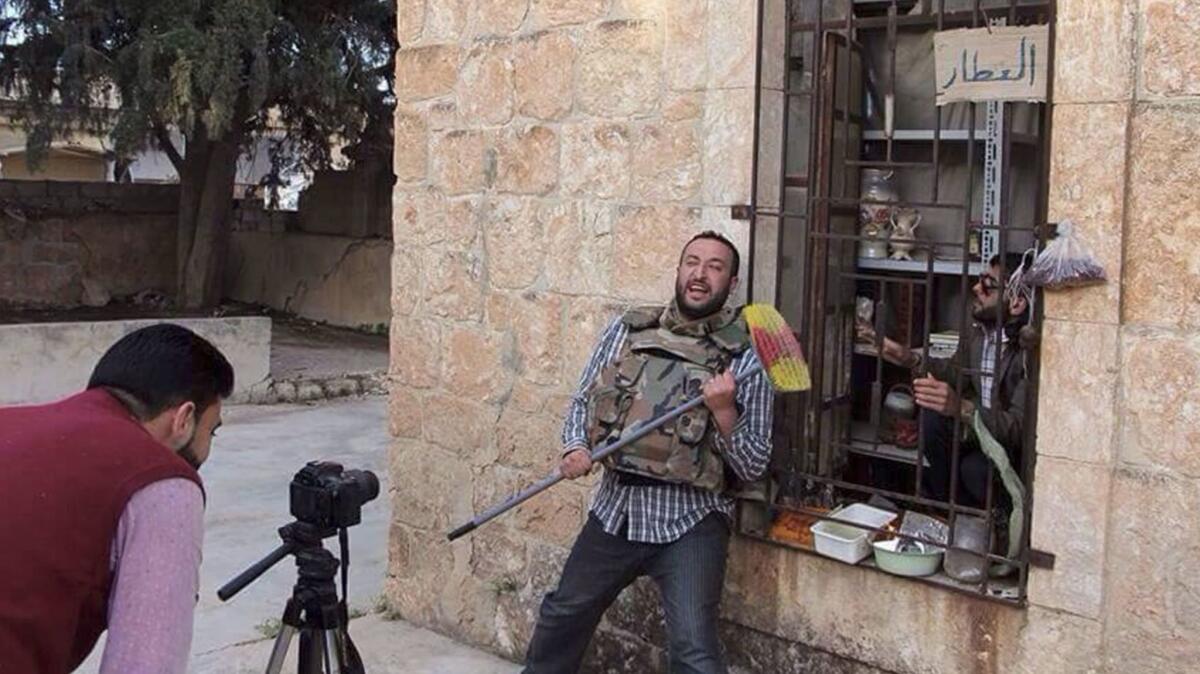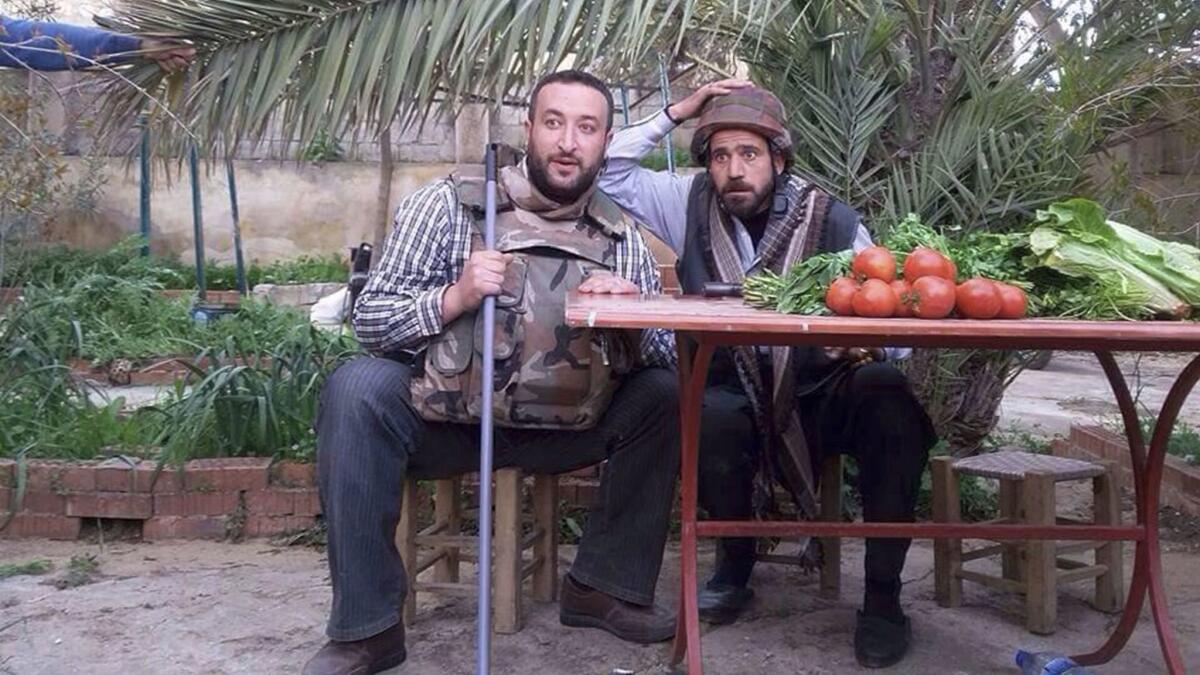Syrian comedy troupe’s brand of satire fails to amuse Assad government

- Share via
Reporting from Beirut — Every time he gets the chance, Ayham Hilal, an Internet cafe proprietor in the Syrian city of Saraqeb, squeezes into a small community center with about 200 fellow theatergoers and loses himself in a comedy show.
The sketches are productions of an all-volunteer performance troupe known as the Saraqeb Youth Group, which has been bringing its brand of satirical theater to the small city east of Idlib through the most brutal chapters of the country’s civil war.
For the record:
9:10 a.m. July 30, 2017An earlier version of this article carried a Saraqeb, Syria, dateline. The dateline should be Beirut.
Sometimes the players perform at a community center, other times at schools and at camps for internally displaced people, and even on the street.
The troupe formed in 2006, five years before the “Arab Spring” uprisings swept into Syria. Protests metastasized into a prolonged and bloody conflict that has left hundreds of thousands dead and millions displaced.
At the time of the troupe’s founding, Ahmad Khatab and Walid Abu Rashid were a pair of artistically inclined teenagers. Khatab played the oud, a pear-shaped stringed instrument used in traditional Arabic music. Abu Rashid had ambitions of becoming an actor.

Along with their love of performance, they shared a distaste for Syrian President Bashar Assad.
With three of their friends, the boys began writing and performing short plays poking fun at Assad.
Their audiences were amused, but the government was not. Soon after the troupe formed, Khatab said, security forces arrested him.
“I was only 16 years old, and they hit me many times,” said Khatab, now a schoolteacher and father of two. “Every six months they took me to jail for four or five days, like, routinely.”
Saraqeb — a primarily Sunni Muslim town of about 30,000 in northwestern Syria that is surrounded by farmland — became an early center of antigovernment protests during the Arab Spring. After the war began, it became a battleground between the Syrian army and Free Syrian Army rebels, but the troupe continued performing.
Sometimes plays were interrupted by the sound of planes overhead and the audience and performers ran to take cover. Two original members of the group were killed, Khatab said. A third joined the exodus of Syrians fleeing the country.
As the conflict escalated, the performers had to worry not only about the government but also about militant Islamist groups including Islamic State and the group then known as Al Nusra Front, which were fighting for control of the area and considered the performers to be unbelievers.
After one performance, as the group members were breaking down the stage, Khatab said, someone lobbed a hand grenade at them. The grenade exploded, but the performers scattered and no one was hurt.
“We don’t know who threw it — maybe Daesh,” Khatab said, referring to Islamic State by its Arabic acronym.
For a while, the group went underground, performing without using its name or advertising its shows. It reemerged publicly in 2014 and began posting videos of its performances on Facebook and YouTube (links in Arabic), as well as shorts the troupe produced for the Web. The sketches offered comedic takes on the daily struggles of life in wartime, such as food shortages and rising prices.
In one sketch, Abu Rashid plays a man infuriated by the skyrocketing price of tomatoes. After the local produce seller tries to charge him $1,500 for slightly more than 3 pounds, the customer takes a potion hoping to travel back in time to buy the fruit at the old, lower prices, and return to sell them at the new price.

Instead, he mixes up the potions and finds himself transported to the future, where his village has been destroyed by bombs, Assad has been succeeded by his son, prices have risen even higher, and the now-ancient former produce seller informs him that he died 20 years ago. In an attempt to return to the past, he goes back too far and finds himself in a tent full of irate tribal warriors in the year 620.
The number of performers has grown to 12 from five. In addition to plays for adults, the troupe now puts on performances for children featuring players dressed as the cartoon cat-and-mouse duo Tom and Jerry. During the height of the fighting, when many schools closed, members of the troupe also began to run a makeshift informal school in Saraqeb.
Khatab said he sees the effects of the war in his daughters, ages 1 and 3.
“My daughter, even if we’re frying potatoes and it makes a noise, she sometimes thinks it’s an airplane and she runs to the bathroom, because this is where we used to hide,” he said.
With the plays, he said, “we have an obligation to change their lives a little and also to give them hope, maybe put a little smile on their tired faces.”
There’s another purpose for the performances, Khatab and Abu Rashid said — to fill the children’s free time so that they don’t drift into armed groups, as many of their classmates did.
Meanwhile, adults find catharsis in the plays. Hilal first saw the group perform in 2012, a year after the war began, in a cultural center that would later be destroyed in an airstrike.
The play of the day was called “Everything Is Fine.” It was about a tribe of Bedouins who are visited by a television crew. The tribal leader, afraid of government security forces, tells the clan members to make no complaints and simply say, “Everything is fine.” Some of the tribe members instead demand electricity and water and sanitation and are taken to jail. Upon their release, the government promises they will get the things they asked for, but nothing changes. The play ends with a call to protest.
Hilal was hooked. Now he never misses a local performance and sometimes travels to see the group perform in other areas. On the third day of the Eid al-Fitr holiday, he and a group of friends from Saraqeb went to watch the troupe perform in Atarib, a town in the west Aleppo countryside.
“What made it special was that they were dealing with sad topics like bombing and bloodshed and war — tragic topics — and at the same time they were presenting it in a satirical fashion,” Hilal said. “We used to laugh and cry at the same time.”
The situation in Saraqeb has calmed — the latest cease-fire between the government and the rebel groups that control the area has held, and now, Hilal said, “for the first time in six years, we don’t hear planes.”
But this month, clashes broke out between rebel factions in the Idlib area, including Saraqeb. According to the Syrian Observatory for Human Rights, a pro-opposition monitoring group based in Britain, one activist was killed and others injured in Saraqeb when forces of the Organization for the Liberation of Syria — an alliance that includes includes the group formerly known as Al Nusra Front until it renounced ties with Al Qaeda — opened fire on a demonstration against the rebel group. Recently, the group and rival rebel faction Ahrar al Sham announced they had once again reached an agreement to end the fighting.
Over the years, Khatab said, he thought about fleeing the country, as some of his friends have done. But in the conflict’s early days, when it was still relatively easy to get across the border to Turkey, he still hoped that the government would be toppled quickly and the war would end.
After Russia intervened in the war, Khatab said, he began to lose hope. But by then the border with Turkey had been closed and escape had become too expensive. To make the journey, he would have to sell his house and would not have a home to come back to.
Abu Rashid, for his part, said he didn’t consider leaving.
“Those who do similar work are very few,” he said. “If we all go to another country, who will be left?”
Troupe members said there was never any question whether they would continue performing.
“We believe in the power of the word,” Khatab said. “A rifle or a weapon can liberate a place, but the word can liberate the mind.”
ALSO
A small town in Italy was losing population. Now Syrian refugees are key to its survival
Confused by all those groups fighting in Syria? We break it down with arm patches
Conflict among Syrian forces may draw U.S. into proxy fight
Sewell is a special correspondent.
More to Read
Sign up for Essential California
The most important California stories and recommendations in your inbox every morning.
You may occasionally receive promotional content from the Los Angeles Times.











